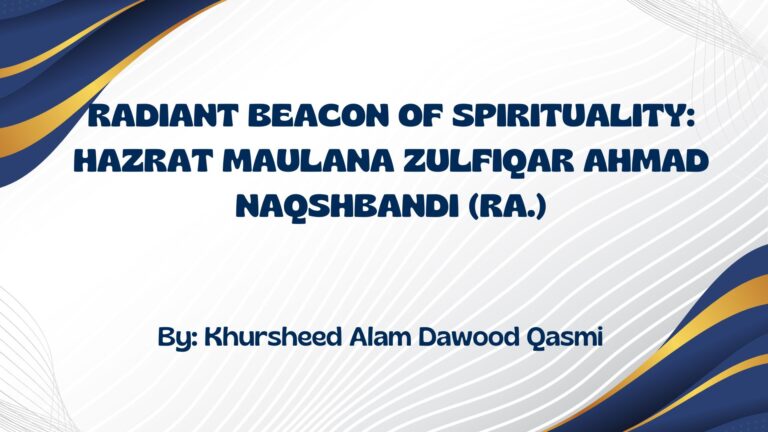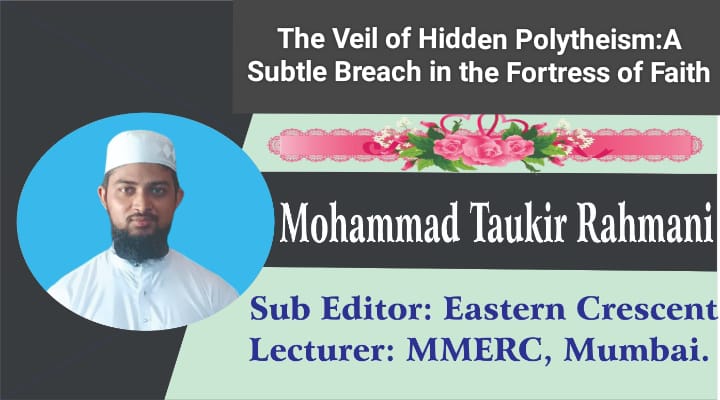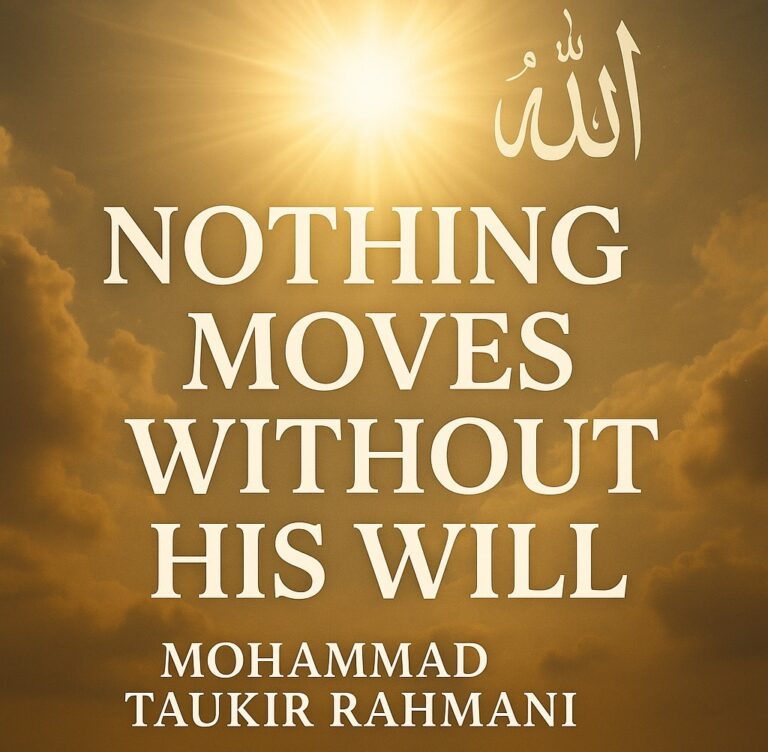
The Divine Choice of Umar: A Philosophical Reflection on Prophetic Wisdom
The Divine Choice of Umar: A Philosophical Reflection on Prophetic Wisdom
By Mohammad Taukir Rahmani
EC Exclusive
Among the many remarkable episodes inscribed in the pages of prophetic history, there are some that resist superficial reading. They demand a deeper gaze—not merely at the surface of events but into the divine strategy silently shaping the destiny of nations through individuals. One such episode is the acceptance of Islam by Umar ibn al-Khattab—a moment that marks more than a personal conversion; it represents a heavenly selection forged through an extraordinary blend of character, inner struggle, and spiritual potential.
At a glance, two towering figures stood on opposite banks of the early Islamic landscape—Umar ibn al-Khattab and Abu Jahl. Both were influential men of the Quraysh, steeped in eloquence, tribal prestige, and political power. Both were fierce opponents of the Prophet Muhammad (saws) in the early days of his mission. They persecuted Muslims, resisted the call to monotheism, and did all they could to bury the light of Islam. To the outward eye, there was little to separate them. Yet the divine lens does not weigh men by the surface of their actions alone, but by the hidden stirrings of their hearts.
Abu Jahl’s rejection of Islam was not due to ignorance. He recognized the truth, but his pride and arrogance blinded him. To him, submission to the Prophet was humiliation; he preferred falsehood wrapped in power over truth that demanded humility. In contrast, Umar’s opposition, though intense, carried within it the seeds of sincerity. His resistance was not born of malice, but of conviction—misguided, yet honest. Beneath his fierce posture lay a yearning for truth, a restlessness of the soul that is often the precursor to transformation.
It is here that we encounter one of the most profound supplications in the seerah of the Prophet (saws), where he prayed: “O Allah, strengthen Islam through the more beloved of these two men to You: Abu Jahl or Umar ibn al-Khattab.”
(Jami‘ al-Tirmidhi, 3681)
This prayer is not a mere personal wish—it is a window into the divine calculus of leadership. The Prophet did not pray for influence through strategy or diplomacy, but placed his trust in divine wisdom. The question is not why Umar was chosen—but what made him worthy of being chosen? And conversely, why did a man like Abu Jahl, with all his brilliance and social capital, become a symbol of rejection?
The Qur’an offers an answer:
“Indeed, Allah is All-Knowing of what is within the hearts.”
(Surah Al-Hajj, 22:46)
It was Umar’s inner truthfulness, his uncompromising sense of justice, and his unyielding resolve that made him a fitting instrument for divine purpose. His stern temperament, when illuminated by faith, became a fortress for Islam. His boldness transformed into courage for truth, and his keen sense of order into a legacy of justice that would echo through the ages.
The Qur’an draws a stark psychological portrait of Abu Jahl and his ilk:
“They denied it, while their inner selves were convinced of its truth, out of sheer injustice and arrogance.”
(Surah Al-Naml, 27:14)

Abu Jahl’s brilliance was never in doubt; it was the arrogance of his soul that veiled the truth. His mind saw the truth, but his heart recoiled from it. Pride became his prison, and envy his master. In contrast, Umar’s apparent hostility masked a deep moral clarity. His acceptance of Islam was not a shift in opinion—it was the ignition of a revolution.
Umar did not merely join the Muslims; he redefined what it meant to be a Muslim. His entry into Islam marked the beginning of its public defiance. Mosques were prayed in openly, da’wah was proclaimed with confidence, and truth no longer walked in shadows. If Abu Jahl tried to bury Islam in silence, Umar raised its voice above the din of disbelief.
The contrast is illuminating. One became “the Pharaoh of this Ummah,” a title that encapsulates his tyrannical obstinance. The other rose to become al-Farooq, the one who distinguished truth from falsehood. One was cast into the dark footnotes of infamy; the other carved his name onto the radiant forehead of Islamic history.
But this leads us to a more subtle and enduring question: Was Abu Jahl deprived by God, or did he choose to deprive himself?
In the language of theology:
“Grace is from God; deprivation is from the self.”
This principle must guide how we evaluate leadership, scholarship, and even personal development. God’s selection is not based on appearance, social status, or eloquent speech—it is based on inner alignment with truth, the purity of intention, and the capacity to shoulder responsibility with sincerity.
The tribal dynamics of early Makkah also played a significant role. Abu Jahl, a scion of Banu Makhzum, was deeply invested in his tribe’s superiority. His rejection of Islam was, in part, a refusal to see the Banu Hashim lead. He saw Islam as a threat to his clan’s dominance. Umar, from Banu Adi, was no less noble, but his nobility aligned with principle, not pride. He did not let tribal politics cloud his moral vision.
Interestingly, while Banu Makhzum resisted, some of its prominent figures—like Khalid ibn al-Walid and ‘Ikrimah ibn Abi Jahl—eventually embraced Islam. But it was Banu Adi, through Umar, that first contributed a leader who bore Islam’s burden in its most fragile stage and helped lift it to strength.
This historical moment offers an enduring lesson: Do not measure leadership by charisma, lineage, or rhetorical power alone. Measure it by the unseen alignment of one’s heart with truth. A society survives when it selects its leaders on the basis of inner integrity, not outer flair. A da’wah endures when its bearers are not merely clever or connected, but trustworthy and truth-driven.
In the end, divine choice is not random. It is guided by eternal principles—truthfulness over tact, sincerity over strategy, courage over calculation. Umar’s story is not just a chapter in Islamic history—it is a mirror held up to every generation asking: Who will you choose? The arrogant schemer or the honest struggler? The one who rejects truth for power, or the one who accepts truth despite all odds?
Nations rise and fall not just by the strength of their armies, but by the depth of their choices. And divine selection—always—begins in the heart.
You May Also Like
 Articles
ArticlesRadiant Beacon of Spirituality: Hazrat Maulana Zulfiqar Ahmad Naqshbandi (Rah.)
By: Khursheed Alam Dawood Qasmi First Acquaintance with Peer Sahib: It was around the...
 Islam
IslamHuman Creation: Existence for the Sacred Trust of Earthly Vicegerency
Human Creation: Existence for the Sacred Trust of Earthly Vicegerency By: Mohammad Taukir Rahmani...
 Culture
CultureThe Flood of Heresy: A Manifestation of Ideological Colonialism and a Trial for Islamic Consciousness
The Flood of Heresy: A Manifestation of Ideological Colonialism and a Trial for Islamic...
 Islam
IslamThe Veil of Hidden Polytheism: A Subtle Breach in the Fortress of Faith
The Veil of Hidden Polytheism: A Subtle Breach in the Fortress of Faith By:...
 Islam
IslamNothing Moves Without His Will
Nothing Moves Without His Will Mohammad Taukir Rahmani EC Exclusive In the vast landscape...
 Islam
IslamThe Wisdom Behind Islamic Festivals: A Path to Social Harmony
The Wisdom Behind Islamic Festivals: A Path to Social Harmony By: Mohammad Taukir Rahmani...

Comments (2)
Leave a Comment
Please let me know if you're looking for a article writer for your weblog. You have some really great posts and I think I would be a good asset. If you ever want to take some of the load off, I'd really like to write some material for your blog in exchange for a link back to mine. Please blast me an e-mail if interested. Cheers!
Hey, you used to write wonderful, but the last several posts have been kinda boring?K I miss your tremendous writings. Past few posts are just a little out of track! come on!